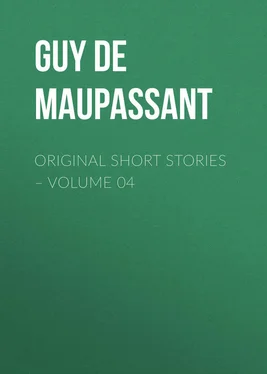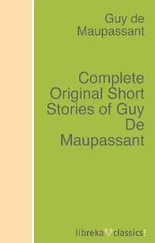Guy Maupassant - Original Short Stories – Volume 04
Здесь есть возможность читать онлайн «Guy Maupassant - Original Short Stories – Volume 04» — ознакомительный отрывок электронной книги совершенно бесплатно, а после прочтения отрывка купить полную версию. В некоторых случаях можно слушать аудио, скачать через торрент в формате fb2 и присутствует краткое содержание. Жанр: literature_19, foreign_antique, foreign_prose, на английском языке. Описание произведения, (предисловие) а так же отзывы посетителей доступны на портале библиотеки ЛибКат.
- Название:Original Short Stories – Volume 04
- Автор:
- Жанр:
- Год:неизвестен
- ISBN:нет данных
- Рейтинг книги:3 / 5. Голосов: 1
-
Избранное:Добавить в избранное
- Отзывы:
-
Ваша оценка:
- 60
- 1
- 2
- 3
- 4
- 5
Original Short Stories – Volume 04: краткое содержание, описание и аннотация
Предлагаем к чтению аннотацию, описание, краткое содержание или предисловие (зависит от того, что написал сам автор книги «Original Short Stories – Volume 04»). Если вы не нашли необходимую информацию о книге — напишите в комментариях, мы постараемся отыскать её.
Original Short Stories – Volume 04 — читать онлайн ознакомительный отрывок
Ниже представлен текст книги, разбитый по страницам. Система сохранения места последней прочитанной страницы, позволяет с удобством читать онлайн бесплатно книгу «Original Short Stories – Volume 04», без необходимости каждый раз заново искать на чём Вы остановились. Поставьте закладку, и сможете в любой момент перейти на страницу, на которой закончили чтение.
Интервал:
Закладка:
Guy de Maupassant
Original Short Stories – Volume 04
THE MORIBUND
The warm autumn sun was beating down on the farmyard. Under the grass, which had been cropped close by the cows, the earth soaked by recent rains, was soft and sank in under the feet with a soggy noise, and the apple trees, loaded with apples, were dropping their pale green fruit in the dark green grass.
Four young heifers, tied in a line, were grazing and at times looking toward the house and lowing. The fowls made a colored patch on the dung-heap before the stable, scratching, moving about and cackling, while two roosters crowed continually, digging worms for their hens, whom they were calling with a loud clucking.
The wooden gate opened and a man entered. He might have been forty years old, but he looked at least sixty, wrinkled, bent, walking slowly, impeded by the weight of heavy wooden shoes full of straw. His long arms hung down on both sides of his body. When he got near the farm a yellow cur, tied at the foot of an enormous pear tree, beside a barrel which served as his kennel, began at first to wag his tail and then to bark for joy. The man cried:
“Down, Finot!”
The dog was quiet.
A peasant woman came out of the house. Her large, flat, bony body was outlined under a long woollen jacket drawn in at the waist. A gray skirt, too short, fell to the middle of her legs, which were encased in blue stockings. She, too, wore wooden shoes, filled with straw. The white cap, turned yellow, covered a few hairs which were plastered to the scalp, and her brown, thin, ugly, toothless face had that wild, animal expression which is often to be found on the faces of the peasants.
The man asked:
“How is he gettin’ along?”
The woman answered:
“The priest said it’s the end – that he will never live through the night.”
Both of them went into the house.
After passing through the kitchen, they entered a low, dark room, barely lighted by one window, in front of which a piece of calico was hanging. The big beams, turned brown with age and smoke, crossed the room from one side to the other, supporting the thin floor of the garret, where an army of rats ran about day and night.
The moist, lumpy earthen floor looked greasy, and, at the back of the room, the bed made an indistinct white spot. A harsh, regular noise, a difficult, hoarse, wheezing breathing, like the gurgling of water from a broken pump, came from the darkened couch where an old man, the father of the peasant woman, was dying.
The man and the woman approached the dying man and looked at him with calm, resigned eyes.
The son-in-law said:
“I guess it’s all up with him this time; he will not last the night.”
The woman answered:
“He’s been gurglin’ like that ever since midday.” They were silent. The father’s eyes were closed, his face was the color of the earth and so dry that it looked like wood. Through his open mouth came his harsh, rattling breath, and the gray linen sheet rose and fell with each respiration.
The son-in-law, after a long silence, said:
“There’s nothing more to do; I can’t help him. It’s a nuisance, just the same, because the weather is good and we’ve got a lot of work to do.”
His wife seemed annoyed at this idea. She reflected a few moments and then said:
“He won’t be buried till Saturday, and that will give you all day tomorrow.”
The peasant thought the matter over and answered:
“Yes, but to-morrow I’ll have to invite the people to the funeral. That means five or six hours to go round to Tourville and Manetot, and to see everybody.”
The woman, after meditating two or three minutes, declared:
“It isn’t three o’clock yet. You could begin this evening and go all round the country to Tourville. You can just as well say that he’s dead, seem’ as he’s as good as that now.”
The man stood perplexed for a while, weighing the pros and cons of the idea. At last he declared:
“Well, I’ll go!”
He was leaving the room, but came back after a minute’s hesitation:
“As you haven’t got anythin’ to do you might shake down some apples to bake and make four dozen dumplings for those who come to the funeral, for one must have something to cheer them. You can light the fire with the wood that’s under the shed. It’s dry.”
He left the room, went back into the kitchen, opened the cupboard, took out a six-pound loaf of bread, cut off a slice, and carefully gathered the crumbs in the palm of his hand and threw them into his mouth, so as not to lose anything. Then, with the end of his knife, he scraped out a little salt butter from the bottom of an earthen jar, spread it on his bread and began to eat slowly, as he did everything.
He recrossed the farmyard, quieted the dog, which had started barking again, went out on the road bordering on his ditch, and disappeared in the direction of Tourville.
As soon as she was alone, the woman began to work. She uncovered the meal-bin and made the dough for the dumplings. She kneaded it a long time, turning it over and over again, punching, pressing, crushing it. Finally she made a big, round, yellow-white ball, which she placed on the corner of the table.
Then she went to get her apples, and, in order not to injure the tree with a pole, she climbed up into it by a ladder. She chose the fruit with care, only taking the ripe ones, and gathering them in her apron.
A voice called from the road:
“Hey, Madame Chicot!”
She turned round. It was a neighbor, Osime Favet, the mayor, on his way to fertilize his fields, seated on the manure-wagon, with his feet hanging over the side. She turned round and answered:
“What can I do for you, Maitre Osime?”
“And how is the father?”
She cried:
“He is as good as dead. The funeral is Saturday at seven, because there’s lots of work to be done.”
The neighbor answered:
“So! Good luck to you! Take care of yourself.”
To his kind remarks she answered:
“Thanks; the same to you.”
And she continued picking apples.
When she went back to the house, she went over to look at her father, expecting to find him dead. But as soon as she reached the door she heard his monotonous, noisy rattle, and, thinking it a waste of time to go over to him, she began to prepare her dumplings. She wrapped up the fruit, one by one, in a thin layer of paste, then she lined them up on the edge of the table. When she had made forty-eight dumplings, arranged in dozens, one in front of the other, she began to think of preparing supper, and she hung her kettle over the fire to cook potatoes, for she judged it useless to heat the oven that day, as she had all the next day in which to finish the preparations.
Her husband returned at about five. As soon as he had crossed the threshold he asked:
“Is it over?”
She answered:
“Not yet; he’s still gurglin’.”
They went to look at him. The old man was in exactly the same condition. His hoarse rattle, as regular as the ticking of a clock, was neither quicker nor slower. It returned every second, the tone varying a little, according as the air entered or left his chest.
His son-in-law looked at him and then said:
“He’ll pass away without our noticin’ it, just like a candle.”
They returned to the kitchen and started to eat without saying a word. When they had swallowed their soup, they ate another piece of bread and butter. Then, as soon as the dishes were washed, they returned to the dying man.
The woman, carrying a little lamp with a smoky wick, held it in front of her father’s face. If he had not been breathing, one would certainly have thought him dead.
Читать дальшеИнтервал:
Закладка:
Похожие книги на «Original Short Stories – Volume 04»
Представляем Вашему вниманию похожие книги на «Original Short Stories – Volume 04» списком для выбора. Мы отобрали схожую по названию и смыслу литературу в надежде предоставить читателям больше вариантов отыскать новые, интересные, ещё непрочитанные произведения.
Обсуждение, отзывы о книге «Original Short Stories – Volume 04» и просто собственные мнения читателей. Оставьте ваши комментарии, напишите, что Вы думаете о произведении, его смысле или главных героях. Укажите что конкретно понравилось, а что нет, и почему Вы так считаете.












